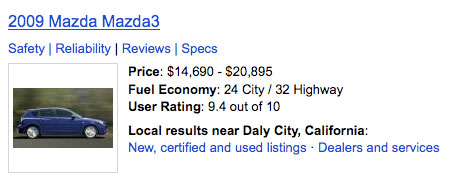 FEAR GRIPS GOOGLE. It’s a nicely classic New York Post headline for a story about the company’s reaction to the launch of Microsoft’s Bing search engine. The Post’s James Doran says that Google cofounder Sergey Brin is so “rattled” by Bing that he’s personally leading a team of engineers who are working on “urgent” upgrades to Google.
FEAR GRIPS GOOGLE. It’s a nicely classic New York Post headline for a story about the company’s reaction to the launch of Microsoft’s Bing search engine. The Post’s James Doran says that Google cofounder Sergey Brin is so “rattled” by Bing that he’s personally leading a team of engineers who are working on “urgent” upgrades to Google.
Is there any there there? I’m not saying that the article is sheer fantasy. But the Post story’s suggestion that frenzy has descended on the Googleplex and hasty steps are being taken to stay competitive with Bing doesn’t ring true.
Doran says:
Brin, according to sources inside the tech behemoth, is himself leading the team of search-engine specialists in an effort to determine how Bing’s crucial search algorithm differs from that used by the company he founded in 1998 with Stanford University classmate Larry Page.
I can’t imagine that the question of how Bing’s algorithm differs from Google’s is a subject of high-level speculation and research at Google. For one thing, Bing’s algorithm doesn’t have much to do with why Bing is interesting. It’s the information and tools that the search engine provides in reaction to four types of searches–ones involving health, travel, local information, and shopping–that give it its personality. They don’t relate to its algorithm, and they aren’t particularly mysterious.
Then there’s the notion of Google rushing out new features to respond to Bing. The thing is, Google is in a continuous state of rushing out new features (like, for instance, this one). Every major Google service is in a state of more or less constant reinvention; if Google were indeed throwing together new Bing-killing features in panicky fashion, I’m not sure if we’d be able to tell them from all the other features it’ll roll out over the next few months. And which it would have rolled out even if Bing didn’t exist.
I can believe that Google takes Bing seriously. (It should–this unquestionably Microsoft’s most ambitious and well thought out attempt to take on Google to date.) I can accept the idea that Sergey Brin has taken a particular interest in it. But it would be even sillier for Google to freak out over Bing than it would be for the company to ignore it.

 The tech world was aflutter last week as Bing catapulted itself to #2 among all search engines. That fun lasted one day. Now that things have come back to earth, data from analytics firm StatCounter show that Bing is
The tech world was aflutter last week as Bing catapulted itself to #2 among all search engines. That fun lasted one day. Now that things have come back to earth, data from analytics firm StatCounter show that Bing is Is an evening 5Words acceptable?
Is an evening 5Words acceptable?